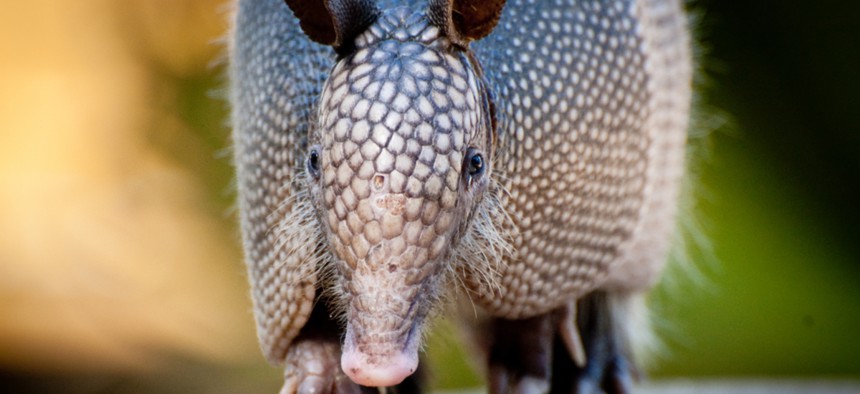Connecting state and local government leaders
State officials are monitoring populations of the nine-banded armadillo, a non-native species that's spreading quickly throughout the country.
Should the problem arise, here’s one way to remove an armadillo from your yard: grab the tail and pick it up.
“But you have to do it carefully,” cautioned Whit Gibbons, a professor emeritus of ecology at the University of Georgia. “I had to take my grandson to emergency care because he picked an armadillo up the wrong way. They can scratch you with their back feet. I don’t think it’s intentional—the armadillo is just trying to get away. Also, I want to make it clear I am not advocating this.”
Depending on where you live, this may be relevant advice. Once confined to certain southern states, the nine-banded armadillo is spreading rapidly across the country, with sightings as far north as Wisconsin and as far east as North Carolina. Researchers can’t pinpoint a reason for the expansion, though it’s generally accepted that climate change and deforestation may have aided the rise of the species.
“The habitat has changed vastly,” said Colleen Olfenbuttel, a biologist for the North Carolina Wildlife Resources Commission. “Up until the early 1900s, a lot of the United States was forested and as European settlers, including farmers, started to clear the land, they actually created habitat for armadillos. They really thrive in secondary-growth areas, where saplings, scrubs and brushes are starting to come up.”
As non-native species go, the nine-banded armadillo is relatively harmless. Technically a mammal and covered in distinctive, scaly plates, the armadillo feasts mostly on insects (grubs, maggots and worms). They’re nearsighted, and dig burrows to hunt for food and to seek shelter from predators and cold weather. Because of that, most complaints that wildlife agencies receive about armadillos come from homeowners who are concerned about property damage.
“They will dig up a garden, and that’s why people consider them a pest—because they’ll dig these burrows in yards,” Gibbons said. “They go all the way in and make it wide enough so they can turn around. And they won’t stay there their whole life—they’ll move around and dig another burrow somewhere else.”
Armadillos can carry the bacteria that causes leprosy in humans, but the risk of contracting the disease is low and requires repeated contact with an infected animal. Because of that, state officials by and large aren’t concerned about the influx of armadillos, though most try to keep tabs on emerging populations.
In North Carolina, the Wildlife Resources Commission asks residents to report their sightings, preferably by email or online through the N.C. Armadillo Project, a crowd-sourced observation map that launched last spring. Residents are encouraged to log the details of their armadillo sighting and, if possible, include a photo. Most observations don’t come with photos and the majority of the ones that do are pictures of roadkill, some of them graphic, Olfenbuttel said.
“Those reports are still important, though, because it gives us the opportunity to send someone out there to confirm that it actually is an armadillo,” she said. “Sometimes, it’s actually a dead turtle.”
Live sightings are rarer, but also helpful, particularly if the person can report the type of behavior they observed. (Mostly, Olfenbuttel said, “they’re just wandering around.”)
Sightings are logged in a spreadsheet and classified as confirmed (photo evidence), credible (no picture, but the description is detailed or can be corroborated by another report) and unconfirmed (no picture, no other reports in that area).
Researchers use that data to track the armadillos’ march through the state, noting how the mammals are traveling and if populations are becoming established in new locations. Knowing the approximate locations of groups of armadillos is helpful for outreach purposes, particularly when residents experience what Olfenbuttel refers to as “conflicts” with the animals.
“We can say with certainty, ‘No, there aren’t armadillos in your area, so the damage to your property was caused by something else,’” she said. “Or we can say, ‘Yep, armadillos are here, and if you are having conflicts with armadillos, here are some things you can do to address those conflicts.’”
Armadillos are difficult to trap—because they dine mostly on bugs, it’s difficult to entice them with bait—so North Carolina authorizes a year-round hunting season on the animals, though so far there have been no confirmed reports of any being shot. Beyond grabbing one by the tail and flinging it out of the yard, there’s no real way to remove them, Gibbons said, though it’s likely they won’t stay very long anyway.
“We had one in our yard here where we live, and I just said, ‘We’ll wait,’ and a week later it was gone over into my neighbor’s yard,” he said. “That’s what you do.”
There’s no known effort to halt the spread or remove new state populations of armadillos, Gibbons said. But they’re still novel enough that researchers tend to get phone calls when the critters mosey into new places.
“It’s odd to me and it’s amazing—I get two to three phone calls about armadillos every week now,” Gibbons said. “They are a very peculiar animal and I really don’t know what else to say about them.”
Kate Elizabeth Queram is a Staff Correspondent for Route Fifty and is based in Washington, D.C.

NEXT STORY: In Hair and Nail Salons, Beauty Experts Are Now Looking for Signs of Domestic Violence



